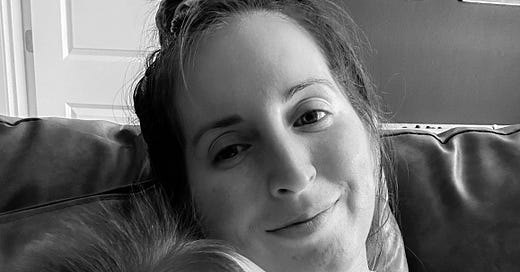Human/Parents Interview: Violet Carol and PPD/PPA
Human/Mother welcomes Substack author of Mother Love Letters!
Human/Parents is an interview series that explores and illuminates various mental health topics that some parents face while simultaneously performing the most important job on the planet: raising the next generation. Guests are Substack creatives who are also parents dealing with one or more of Human/Mother’s rotating monthly mental health topics.
This month’s topic is postpartum anxiety and depression.
So, pour yourself that third cup of coffee, snuggle in, get cozy, and get ready to meet our next guest:
from !Hi, Violet! Thank you so much for being here. Tell us a little about yourself and your Substack. How did you find writing, or, maybe, rather, how did writing find you? What led you to start
, and what is your goal for your newsletter?Thank you so much for having me on your publication. I’m really happy to be here and love that you’ve created this incredible series for your readers!
I’m currently based in the Pacific Northwest, working from home part-time and counting down the days until wildflower season. I’m in a big career shift, winding down my legal practice to focus on motherhood and hopefully writing as a career itself sometime in the near future. I read as much as I write — my favorite recent read is The God of the Woods by Liz Moore (hello, fellow Substack bookworms).
Mother Love Letters started as a cathartic passion project that has now taken over my right-brain, and I cannot stop writing about motherhood. I had no idea that matrescence would call my creativity to the forefront of my life so energetically, but now I’m 37 unfinished drafts deep and there’s no stopping me now!
Writing is a necessity for me. It’s how I make sense of the world and preserve my own. I have tried pushing it aside for other adult-y things, but it always resurfaces. After the birth of my daughter, I stopped burying it and now it’s fully alive.
I want Mother Love Letters to reach millions of readers, and I want to keep writing about matrescence, identity, love, and time in perpetuity. I want to write magical fiction novels with nuanced mom characters! I want to make poetry films about nostalgia in puffy Selkie dresses! I want all this mom stuff and word stuff to pop like confetti!
Love it! I felt the same, unignorable pull back to my creative self after becoming a mother, so I 100% relate. Now, let’s cut to the chase and get into your postpartum anxiety and depression experience. Tell us about the moment you realized you were struggling. Perhaps, you could provide us with some examples of what your PPD/PPA looked like when you were at your lowest.
My anxiety took a nosedive four months postpartum, right around the time my maternity leave ended and the smoke of “real life” contaminated my newborn bubble.
It was hard to discern between what was postpartum anxiety or depression versus general feelings of anxiousness or exhaustion at first. Every woman experiences, to some degree after giving birth, notable fatigue, irritability, mood swings, and worry about the new tiny human(s) they’re suddenly responsible for. But when my symptoms manifested into physical ailments and were unable to be managed by basic coping mechanisms, then it became clear that something more serious had taken root.
I specifically struggled with postpartum anxiety. I wasn’t sure if I was also experiencing postpartum depression until my thyroid levels were checked shortly after I gave birth and I learned that the symptoms of hypothyroidism can mirror depression, especially in the postpartum period.
I highly recommend that all postpartum women get bloodwork done to check their thyroid levels (TSH, Free T4, and Thyroid Antibodies, commonly). I had labs taken about 6 weeks after the birth of my daughter and discovered that my seemingly depressive symptoms were actually symptoms of my continuing hypothyroidism that I thought would disappear after pregnancy. It turns out, my pregnancy triggered a once-dormant Hashimoto’s response that I now have to manage monthly. After I was prescribed a weight-based dose of Levothyroxine to balance my hormone levels, my depressive symptoms vanished almost instantly.
My anxiety, on the other hand, was unable to be contained. Physically, it manifested in my stomach, giving me debilitating belly-aches, too-frequent cramping, perpetual nausea, and vertigo. Psychologically, my mind ran random intrusive thought cycles. A random phrase would pop into my head (like, “I want to cut my strawberries later”), and my mind would repeat this phrase over and over, like it was trying to burrow itself into my psyche. I also often woke in a panic that something terrible had happened to my baby; one night I confused the shadow of my floor fan for a haunting presence that sent me into a full night of sleeplessness and terror, and I knew then that I needed professional help.
My OB/GYN prescribed me an anxiolytic that specifically targeted anxiety symptoms at a low dose (Buspirone). I only needed one pill per day, and was able to wean off three months later when my anxiety fully subsided for at least a month. My intrusive thoughts ceased, my head felt lighter, and my cyclical worry stopped manifesting in my stomach. I was able to pursue more gentle techniques (focusing on proper-ish nutrition, light movement and stretching, sleep shifts with my husband) that were not possible before to maintain my general health and stress levels.
Anxiety medication is sometimes a necessary cure. You cannot always “self-care” your way out of a chemical imbalance. Sometimes you need a little boost from science, and I hope that any mother reading this feels zero shame and full confidence in requesting what they need from their doctor when they need it.
How did PPD/PPA affect your ability to mother and bond with your child after giving birth? Does it still have an effect on the relationship you have with your child? In what ways (if at all)?
I co-slept with my daughter via bedside bassinet for nearly six months. I believe having her next to me helped my PPA knowing she was an arm’s reach away at any moment. Though sometimes, the newborn era sleep deprivation would kick in and I would shoot straight up out of sleep wondering if I accidentally fell asleep with my baby on my chest, but I think that was just part of my new mom induction ceremony.
How did PPD/PPA affect your marriage, and how did you and your partner handle that?
PPA luckily did not have any adverse effects on my marriage. My husband is incredibly empathetic, selfless, and attentive. For every panicky episode I experienced, he was there to hold me through it. He also encouraged me to reach out to my doctor about treatment options when my panicking became too frequent to be considered “normal.” A supportive partner is a privilege I wish for every mother.
Could you share with us some ways you’ve found to cope with the experience? How are you finding healing or help? Do you have any specific resources to share with our readers?
Talking to other mothers who went through similar experiences helped me more than almost anything. My best friend Lindsay had her first baby a few years prior and was unfortunately well-versed in PPA. Despite suffering through the aftermath of her own birth trauma, she became an inspirational force for her community by talking about the “hard stuff” and showing up for anyone in her orbit (pumping breastmilk for friends, preparing giant meals for postpartum acquaintances, sending care packages to anyone in need of a mood boost). She is a superwoman (she helped me write my “Breastfeeding Is a Full-time Job (Part 2)” post) and I’m so grateful to her for helping me feel understood in a chaotic period of what felt like temporary, clinical insanity.
For new mothers who are struggling right now with PPD/PPA, what advice do you have for them? Did you adopt a mantra, meditation, or growth mindset that was helpful to you throughout your experiences with PPD/PPA?
TALK ABOUT IT!!!! Tell your partner. Tell your loved ones you trust. Tell your doctor. Tell your mom friends when they ask you how you’re doing. Tell your friends without children how you really feel. Read a bunch of Substack posts on
about PPA. Someone will guide you to a mantra, a meditation, a growth mindset, a yoga studio, a CrossFit gym, an ocean, a hillside, a poem, a verse, an open-armed bear hug, a therapist – wherever you need to go, someone will help you get there as long as they know you need help.And if you’re not sure if you need help, then that usually means you do.
YES!!! Totally. If I could go back in time, I would have given myself permission to ask for help, or, at the very least, talk about it with someone. Too often, I think, women feel that they are failing if they aren’t “winning” at motherhood, so it’s hard to pin down whether or not we are struggling beyond the “norm.” But, the truth is, it doesn’t matter what the norm is; if we need help, we need help.
Lastly, is there a question that I haven’t asked that you wish I would have or a final thought that you’d like to end on?
The only person who can advocate for your own body is you. Be hypervigilant. Don’t worry about overreacting. You just had a baby! You did the COOLEST thing a human can do. You cannot be more afraid to ask for help after birth than you were to give birth. You matter, and so does your mental health.
Thank you again for using your publication for these guest essays – I’m grateful to every piece of writing that helped me feel seen in the throes of early postpartum, and so I hope this interview helps those who may need it now, too.
(IT ALL GETS BETTER, I PROMISE).
XO,
***
Wow! Good stuff! Thank you so much for your vulnerable sharing of your motherhood journey,
! I appreciate your openness and willingness to dive into such an important topic, particularly for new mamas. I’m also a reader and fan of your newsletter, , so I highly recommend it to anyone who is looking for community in motherhood AND in life!If you or someone you know has experienced or is experiencing postpartum depression or anxiety, please consider sharing this post, commenting, or tapping that heart below. Tell us your story, offer any advice or wisdom gained through your own personal experience, and/or let us know which details of Violet’s story you found relatable, helpful, or hopeful.
Wherever you are in your journey, know that you deserve peace, hope, and love.








Thank you for having me 🥹❤️
"if you’re not sure if you need help, then that usually means you do." This is the message we should be giving all new parents!